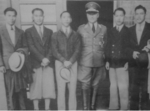John Wong
| Surname | Wong |
| Given Name | John |
| Country | China |
| Category | Military-Air |
| Gender | Male |
Contributor: C. Peter Chen
ww2dbaseJohn Wong (Cantonese: Poon-Yeung Wong; Mandarin Pinyin: Panyang Huang) was born in Changshan County, Guangdong Province, China. At the age of 6, his father brought him to Seattle, Washington, United States, where he would remain with his uncle even after his father returned to China six years later. Shortly after, he moved to Portland, Oregon, United States, where he befriended fellow aviation enthusiast Arthur Chin (Cantonese: Sui-Tin Chan; Mandarin Pinyin: Ruidian Chen). Wong and Chin enrolled in a Portland flight school established by Chinese-Americans together; their tuition and expenses were paid by donations from the Chinese-American community in exchange for their promise to join the Chinese military in the war against Japan upon their graduation. Wong received his US civilian pilot's license in Apr 1932, and then traveled to China to join the Guangdong Provincial Air Force. In 1935, he was sent to Germany, again along side of Chin, for advanced training at the Luftwaffe airfield in Lagerlechfeld in southern Germany. When he returned to China, the Nationalist central government's air force had taken control of the air units from Guangdong, thus Chin was assigned to 17th Pursuit Squadron of the central government's 3rd Pursuit Group as the squadron commander, flying P-26 (exported under the designation Boeing 281) fighters. On 17 Aug 1937, during the Japanese Kanoya Kokotai (based in Taiwan) attack on Chuyung Airfield near Nanjing where his squadron was based, he shot down a G3M bomber (killing piot Lieutenant Commander Nitta), heavily damaged a second G3M bomber (Wong claimed a victory, but Japanese records showed that pilot Lieutenant (jg) Watanabe was able to nurse the bomber back to a Japanese airfield on one engine), and shared a downing of a third G3M bomber with a fellow pilot. In early Oct 1937, he shot down a Japanese bomber on a reconnaissance mision while flying the Chinese Air Force's only P-36 fighter (exported under the designation Hawk 75). On 12 Oct 1937, flying one of the last two surviving P-26 fighters in Chinese Air Force's inventory (the other being flown by Lieutenant Wong Tse-tsim in this engagement), intercepted a Japanese bombing mission of 9 G3M bombers escorted by 11 A5M fighters; he shot down the A5M fighter flown by Mazazumi Ino, but then was forced to cut his mission short when his map case broke loose during maneuvers and struck him in the head, disorienting him. In Nov 1937, his squadron was relocated to Hangzhou, Zhejiang Province, China. On 3 Dec, Wong flew a reconnaissance mission in a P-26 fighter out of Nanjing, China. On 3 Dec, he flew a reconnaissance missiong over Shanghai, China. On 9 Dec, the squadron received orders to go to Lanzhou (Postal Map: Lanchow), Gansu Province, China to receive Soviet-made I-15bis fighters. In Apr 1938, Wong was promoted to command 5th Pursuit Group. In Jun 1938, he was transferred to Shaoguan (Postal Map: Shao-kwan), Guangdong Province, China, where he would be reunited with his friend Arthur Chin, who was now the commanding officer of 28th Pursuit Squadron. On 16 Jun 1938, he led a group of nine Gladiator fighters, with Chin as his wingman, to intercept six Japanese G3M bombers over Guangdong Province aiming to attack Lechang Railway Station (now Pingshi Lechang Railway Station in Shaoguan). Wong dove under one bomber and fired upwards, igniting the external bomb; as the first bomber fell, the explosion damaged a nearby bomber, and Wong followed up to destroy the damaged bomber. Meanwhile, Chin shot down the third bomber of that particular flight. In 1939, he was involved in several aerial engagements over Guangxi Province, China, but did not score any victories. In 1940, he entered staff college. Later in the war, he served abroad as an air attaché.
ww2dbaseSource: Raymond Cheung, Aces of the Republic of China Air Force
Last Major Revision: Nov 2015
John Wong Interactive Map
Photographs
 |
John Wong Timeline
| 17 Aug 1937 | John Wong, flying a P-26 fighter, shot down Lieutenant Commander Nitta's G3M bomber northeast of Chuyung Airfield near Nanjing, China; Nitta was either killed during the crash, or, according to Japanese records, committed suicide after a crash landing. Shortly afterwards, Wong heavily damaged Lieutenant (jg) Watanabe's G3M bomber, followed by a joint victory over yet another G3M bomber (credit shared with Lieutenant Wong Tse-tsim). |
| 20 Sep 1937 | John Wong, flying a P-26 fighter, damaged a Japanese floatplane over China. |
| 12 Oct 1937 | John Wong, flying a P-26 fighter, shot down a Japanese A5M fighter over China. |
| 3 Dec 1937 | John Wong, flying a P-26 fighter, flew a reconnaissance mission out of Nanjing, China over the Shanghai area. He radioed the number of Japanese aircraft parked at several airfields, and escaped the Japanese fighters that rose to intercept him. |
| 16 Jun 1938 | John Wong, flying a Gladiator fighter and leading eight others, attacked a group of six Japanese G3M bombers over Guangdong Province, China, shooting down two. |
Please consider supporting us on Patreon. Even $1 per month will go a long way! Thank you. Please help us spread the word: Stay updated with WW2DB: |
» Second Battle of Shanghai
Related Books:
» Aces of the Republic of China Air Force
- » 1,167 biographies
- » 337 events
- » 44,601 timeline entries
- » 1,243 ships
- » 350 aircraft models
- » 207 vehicle models
- » 376 weapon models
- » 123 historical documents
- » 261 facilities
- » 470 book reviews
- » 28,520 photos
- » 367 maps
George Patton, 31 May 1944
Please consider supporting us on Patreon. Even $1 a month will go a long way. Thank you!
Or, please support us by purchasing some WW2DB merchandise at TeeSpring, Thank you!